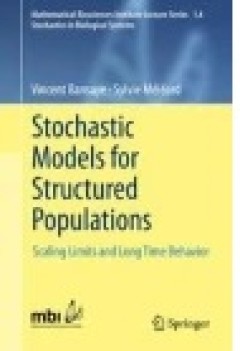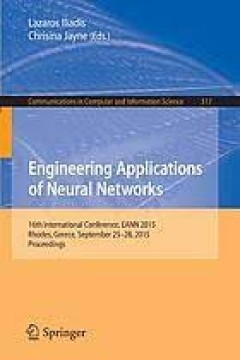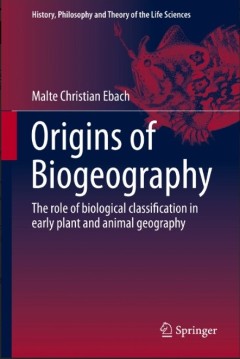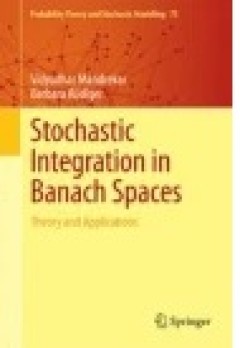Filter by

Orphan Lung Diseases : A Clinical Guide to Rare Lung Disease
Orphan Lung Diseases: A Clinical Guide to Rare Lung Disease provides a comprehensive, clinically focused textbook on rare and so-called ‘orphan’ pulmonary diseases. The book is oriented towards the diagnostic approach, including manifestations suggesting the disease, diagnostic criteria, methods of diagnostic confirmation, and differential diagnosis, with an overview of management.
- Edition
- -
- ISBN/ISSN
- 978-1-4471-2401-6
- Collation
- -
- Series Title
- -
- Call Number
- 616.24 ORP

Stochastic Models for Structured Populations
This course concerns the stochastic modeling of population dynamics. In the first part, we focus on monotype populations described by one-dimensional stochastic differential equations with jumps. We consider their scaling limits for large populations and study the long time behavior of the limiting processes. It is achieved, thanks to martingale properties, Poisson measure representations, a…
- Edition
- -
- ISBN/ISSN
- 978-3-319-21711-6
- Collation
- -
- Series Title
- -
- Call Number
- -

Engineering Applications of Neural Networks 16th International Conference, E…
This book constitutes the refereed proceedings of the 16th International Conference on Engineering Applications of Neural Networks, EANN 2015, held in Rhodes, Greece, in September 2015. The 36 revised full papers presented together with the abstracts of three invited talks and two tutorials were carefully reviewed and selected from 84 submissions. The papers are organized in topical sections…
- Edition
- -
- ISBN/ISSN
- 978-3-319-23983-5
- Collation
- 130 illustrations in colour
- Series Title
- -
- Call Number
- -

Engineering Applications of FPGAs Chaotic Systems, Artificial Neural Network…
This book offers readers a clear guide to implementing engineering applications with FPGAs, from the mathematical description to the hardware synthesis, including discussion of VHDL programming and co-simulation issues. Coverage includes FPGA realizations such as: chaos generators that are described from their mathematical models; artificial neural networks (ANNs) to predict chaotic time series…
- Edition
- -
- ISBN/ISSN
- 978-3-319-34115-6
- Collation
- 74 b/w illustrations, 130 illustrations in colour
- Series Title
- -
- Call Number
- -

Stochastic Modeling of Thermal Fatigue Crack Growth
The assessment of thermal fatigue crack growth due to turbulent mixing of hot and cold coolants presents significant challenges, in particular, to determine the thermal loading spectrum. Thermal striping is defined as a random temperature fluctuation produced by incomplete mixing of fluid streams at different temperatures, and it is essentially a random phenomenon in a temporal sense.
- Edition
- -
- ISBN/ISSN
- ISBN 978-3-319-12877-1
- Collation
- -
- Series Title
- -
- Call Number
- -

Origins of Biogeography : The role of biological classification in early plan…
This book presents a revised history of early biogeography and investigates the split in taxonomic practice, between the classification of taxa and the classification of vegetation. It moves beyond the traditional belief that biogeography is born from a synthesis of Darwin and Wallace and focuses on the important pioneering work of earlier practitioners such as Zimmermann, Stromeyer, de Candoll…
- Edition
- -
- ISBN/ISSN
- 978-94-017-9999-7
- Collation
- -
- Series Title
- History, Philosophy and Theory of the Life Sciences
- Call Number
- 578.09 EBA o

Engineering Applications of Computational Fluid Dynamics
This volume presents the results of Computational Fluid Dynamics (CFD) analysis that can be used for conceptual studies of product design, detail product development, process troubleshooting. It demonstrates the benefit of CFD modeling as a cost saving, timely, safe and easy to scale-up methodology.
- Edition
- -
- ISBN/ISSN
- 978-3-319-02836-1
- Collation
- 42 b/w illustrations, 66 illustrations in colour
- Series Title
- -
- Call Number
- -

Thermal Transport in Oblique Finned Micro/Minichannel
The main aim of this book is to introduce and give an overview of a novel, easy, and highly effective heat transfer augmentation technique for single-phase micro/minichannel heat sink. The specific objectives of the volume are to: Introduce a novel planar oblique fin microchannel and cylindrical oblique fin minichannel heat sink design using passive heat transfer enhancement techniques Investi…
- Edition
- -
- ISBN/ISSN
- 978-3-319-09647-6
- Collation
- 15 b/w illustrations, 80 illustrations in colour
- Series Title
- -
- Call Number
- -

Stochastic Integration in Banach Spaces
The study of stochastic differential equations (SDEs) driven by Lévy processes in R originated in the book by Skorokhod [97]. In view of the Lévy–Itô decomposition, he reduced the problem of studying such SDEs to the analysis of SDEs driven by compensated Poisson random measures (cPrms) and Brownian motion, under a mild restriction [97]. He was aware of the fact that the restriction ca…
- Edition
- -
- ISBN/ISSN
- 978-3-319-12853-5
- Collation
- -
- Series Title
- -
- Call Number
- -

Engaging with Student Voice in Research, Education and Community Beyond Legi…
This work interrupts the current “consulting students” discourse that positions students as service clients and thus renders more problematic the concept of student voice in ways that it might be sustained as a democratic process. It looks at student voice holistically across realms of classroom practices, higher education, practitioner inquiry and policy formulation. The authors render pro…
- Edition
- -
- ISBN/ISSN
- 978-3-319-01985-7
- Collation
- 2 b/w illustrations
- Series Title
- -
- Call Number
- -
 Computer Science, Information & General Works
Computer Science, Information & General Works  Philosophy & Psychology
Philosophy & Psychology  Religion
Religion  Social Sciences
Social Sciences  Language
Language  Pure Science
Pure Science  Applied Sciences
Applied Sciences  Art & Recreation
Art & Recreation  Literature
Literature  History & Geography
History & Geography